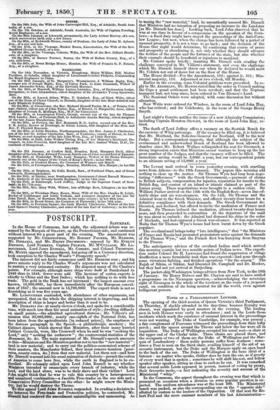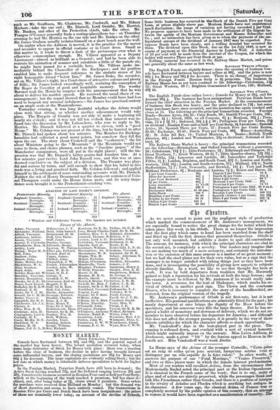NOTES OFA PARLIAMENTARY Leerier& The opening of the third session
of Queen Victoria's third Parliament, on Thursday, if slackly attended in the day-time, because Royalty was absent, was signalized by good musters in the evening. The leading men in both Houses were early in attendance ; and in the Lords those incidents which mark the existence of unusual interest in the proceedings were not wanting. The Duke of Cambridge, for example was present; a fair complement of Peeresses witnessed the proceedings example, their lofty perch; ; and the spaces around the Throne and below the bar were all in requisition. The Duke of Wellington occupied his usual seat—a chair at the upper end of the Clerks' table. Three chairs are placed there, and the occupants of two of them are the Duke of Wellington and the Mar- quis of Londonderry : these noble persons suffer from deafness : some- times a Peer is seen on the third chair, availing himself of the aid of an acoustic instrument, but the Duke and the Marquis apply an open hand to the back of the ear. The Duke of Wellington is the beau ideal of a listener : no matter who speaks, thither does he turn the ear, as if greedy of every word that is spoken ; sometimes he will shift his seat, and follow speaker after speaker, sitting as close to each as he can. It was remarked that several noble Lords appeared in person, instead of voting by P their favourite mode,—a fact indicating the severity and success ori%
Ministerial "whip."
In the Commons, the aspect throughout the evening was that which is presented on occasions when a division on some popular question is ex- pected.The uniform attendance was at the least 300. The Ministerial bench was packed, as also the corresponding one on the "opposite side" allotted by custom to the leaders of the Opposition. Of that seat Sir Ro- bert Peel and the more eminent members of his last Administration- such as Mr. Goulburn, Mr. Gladstone Mr. Cardwell, and Mr. Sidney Herbert—take the one end ; Mr. Disraeli, Lord Granby, Mr. Herries, Mr. Bankes, and other of the Protection chiefs, take the other. Mr. Feargus O'Connor generally finds a resting-placeithere too : on Thursday evening he had Mr. Berries on the one side and Mr. Bankes on the other. Sir James Graham usually isolates himself on a short bench near the wall. On nights when the Address is moved, it is the practice for the mover and seconder to appear in official costume or in Court dress. Small SS This matter is, it tends to throw a dash of the picturesque over what is otherwise commonplace enough. Mr. Villiers appeared as a Deputy Lieutenant—almost as brilliant as a General ; and had he been able to restrain his animation of manner and substitute a little of the parade air, he might have passed for a veritable hero. Mr. Villiers spoke im- mediately behind the Chancellor of the Exchequer ; and the position enabled him to make frequent reference to the statistic stores of his right honourable friend "below him." Sir James Duke the seconder, sat on Mr. Villiers's right, in a Court dress of attractive odours and plenty of frills ; Sir James looked exceedingly well, realising the conception of Sir Roger de Coverley of good and hospitable memory. The worthy Baronet took the House by surprise with the announcement that he was about to deliver his maiden speech. He received the usual cheer of en- couragement; but the sequel showed that no Member could have had less need to bespeak any unusual indulgence—Sir James has practised oratory en an ample scale at the Mansionhouse. Yesterday evening, it was long doubtful whether the debate would close with that sitting, or whether another adjournment would take place. The Marquis of Granby was not able to make a beginning till nearly six o'clock ; and it was not till ten o'clock that interest was in- fused into the discussion by Mr. Labouchere, who rose to reply to Mr. Berries. Mr. Disraeli followed at a quarter to eleven, with a "good House." Mr. Cobden was not present at the time, but he hurried in after Mr. Disraeli had spoken about ten minutes. The Member for Bucking- hamshire had collected a good many points, but somehow they fell fiat upon the ear. The story about Cromwell and the "corkscrew," the hit about Ministers going to the "Mountain" if the Mountain would not come to them, and choice phrases, such as the "Jacobite jargon" of the Manchester conspirators, were all put in the right places ; still the iM- pression was that Mr. Disraeli's better genius bad forsaken him. At a few minutes past twelve Lord John Russell rose and this was at once deemed conclusive on the subject of a division. The Premier was play- ful and serious by turns, and said enough to show that his belief in free trade was a living and practical faith. Mr. Cobden followed; and applied himself to the settlement of sonic outstanding accounts with Mr. Disraeli. Neither the wit of Henry Drummond nor the sharp-cut sentences of Colo- nel Thompson could make the House listen more, and its noisy impa- tience soon brought it to the Protectionist-crushing vote.



























 Previous page
Previous page